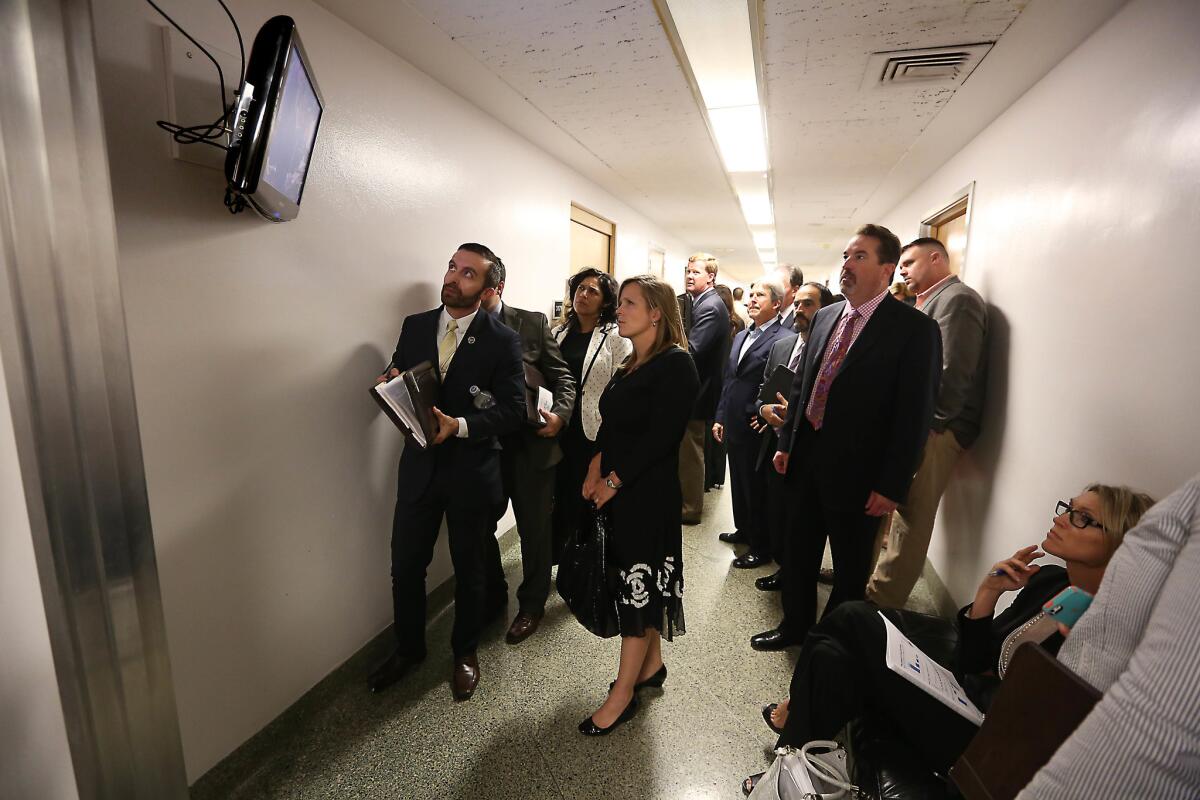Spending on lobbying in California tops $309 million, the second-highest amount ever recorded in the state

Reporting from Sacramento — Interest groups spent $309 million on lobbying California government officials last year, with new records showing the oil industry, environmental groups, labor unions and the health industry poured the greatest amounts into legislative and regulatory battles.
It is the second time in the state’s history that more than $300 million has been spent in a year, just short of the record $314 million paid out for lobbying in 2015.
Seeing such large amounts spent by moneyed interests is a concern, public advocates say, because it reflects an effort to exert heavy influence on government officials that average citizens may not be able to match.
Lobbying expenses, which must be reported to the state, include money that goes directly to individual lobbyists as well as other “payments to influence,” which can include cash spent on research, organizing public rallies, and television and radio ads that urge voters to contact their lawmaker on specific bills.
The biggest spender was the Western States Petroleum Assn., which reported $7.7 million in payments for work, including a big push against Senate Bill 32, which requires greenhouse gas emissions to be 40% below 1990 levels by 2030.
“It was the battle of the year,” said Jamie Court, executive director of the advocacy group Consumer Watchdog. “The oil companies spent a ton of money.”
The oil group said the measure “puts accessible and reliable energy at risk.”
Expenses reported by the petroleum group included a total $721 spent on dinner at the Spago restaurant in Maui for eight lawmakers, including state Sen. Tom Berryhill (R-Twain Harte) and Democratic Assemblymen Miguel Santiago and Reggie Jones-Sawyer, both of Los Angeles.
The group also picked up a $1,599 tab for Assemblyman Rudy Salas Jr. (D-Bakersfield) to stay at the Ritz-Carlton hotel in Half Moon Bay.
The association’s president, Cathy Reheis-Boyd, said her group’s expenditures for lobbying activities “are a direct reflection of the enormous number of issues confronting the energy industry in California, and the potential impact those issues have on energy producers, refiners, consumers and businesses.”
Chevron Corp., a member of the petroleum association, was the fourth biggest spender on lobbying last year, paying out $3 million.
The oil industry did battle with the second biggest spender on lobbying last year, NextGen Climate Action, an environmental activism group founded by billionaire Tom Steyer. NextGen reported $7.4 million spent on lobbying, including support for SB 32.
The spending included $19,608 for a legislative reception attended by 25 lawmakers and legislative staffers at an upscale Sacramento hotel.
The vast majority of NextGen’s lobbying spending went to pay for television advertisements supporting SB 32 and other clean air laws, urging voters to contact their lawmakers and ask for a positive vote.
“Tell your legislator to stand up to the oil companies and protect our clean air laws,” Steyer said in one of the ads.
Steyer, who has been considering a run for governor, was seeking to counter the lobbying effort of the oil industry, a representative said.
“We ran clean air ads this summer that served as a counterweight to the oil industry’s entrenched influence and helped pass historic legislation to combat pollution,” said Andrew Santana, a spokesman for NextGen.
The third biggest spender on lobbying in 2016 was the California State Council of Service Employees, which put $5.6 million into its advocacy efforts at a time when many state employee bargaining units were negotiating new contracts.
Laphonza Butler, president of SEIU California, said its spending should not be compared to that of corporations like Exxon or R.J. Reynolds.
“It comes from small donors — everyday working people, who contribute a small portion of their earnings to standing up for themselves and every other California family who is not a member of SEIU to fight corporate power by increasing the minimum wage or protecting women at work against sexual assault,” Butler said in a statement.
Health industry firms and groups and activists for accessible healthcare spent a combined $34 million last year getting their message to state officials.
Two of the most lobbied bills included a failed measure providing prescription drug pricing transparency and a successful measure protecting patients who go to in-network hospitals from surprise, high bills from out-of-network physicians.
The latter bill drew opposition lobbying from several physicians’ groups, including the California Academy of Eye Physicians and Surgeons and the California Society of Plastic Surgeons, who combined spent more than $600,000 on lobbying last year.
“The term ’World War III’ was invoked on both of the bills in terms of there was lots of lobbying on both sides,” said Anthony Wright, executive director of Health Access, a consumer advocacy group. “In both cases, you saw a specific part of the industry pull out the stops in terms of money and lobbying to at least slow it down, if not stop it.”
Spending on lobbying does not always pay off. Tobacco industry groups, including giant tobacco firm Altria and RAI Services Company spent $1.1 million on lobbying last year, but failed to defeat bills that raised the smoking age to 21 and banned use of electronic cigarettes in many public places, including restaurants and theaters.
The American Cancer Society and American Heart Assn. spent a combined $447,000 lobbying for the package of anti-tobacco bills.
“The tobacco industry spends a lot of money at the State Capitol to protect profits, but they do it at the expense of public health,” said Lindsey Freitas, a senior director for the American Lung Assn. of California.
Twitter: @mcgreevy99
ALSO:
Political Road Map: Revamped primaries changed California politics, but not like everyone thought
Political Road Map: That love-hate relationship with California ballot initiatives
More to Read
Get the L.A. Times Politics newsletter
Deeply reported insights into legislation, politics and policy from Sacramento, Washington and beyond. In your inbox three times per week.
You may occasionally receive promotional content from the Los Angeles Times.











